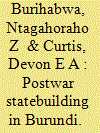| Srl | Item |
| 1 |
ID:
179821


|
|
|
|
|
| Summary/Abstract |
The widespread enthusiasm for internationally-supported liberal statebuilding since the 1990s has become much more tempered, due in part to the mixed record of postwar liberal statebuilding. Over time, many postwar countries have adopted more authoritarian statebuilding trajectories, despite the fact that negotiated peace agreements tend to reflect liberal principles. This is often attributed to ‘liberal’ international actors encountering resistant ‘illiberal’ domestic elites. The postwar statebuilding trajectory in Burundi appears to fit this dominant narrative, with the ruling party, the Conseil National pour la Défense de la Démocratie-Forces pour la Défense de la Démocratie (CNDD-FDD), deviating from some of the liberal principles that underpinned the Burundian peace agreement. Drawing on a detailed analysis of the internal politics of Burundi's ruling party, we show that this account is flawed. We question overly simplified accounts of ‘illiberal’ ruling party elites and we argue that tensions, competition and fragmentation within the ruling party were decisive in Burundi's statebuilding path. Rather than seeing Burundi as an inevitable failure of liberal statebuilding, we highlight how there was some commitment to liberal principles even within the ruling party. Internal struggles within the ruling CNDD-FDD led to current outcomes in Burundi, which should not be interpreted as predestined or definitive. We show that understanding the complexities, diversities and contingencies within ruling parties opens new spaces for thinking about the creation and recreation of political orders after war.
|
|
|
|
|
|
|
|
|
|
|
|
|
|
|
|
| 2 |
ID:
074430


|
|
|
|
|
| Publication |
2006.
|
| Summary/Abstract |
Since 1967, ASEAN has established intramural relations that forsake war as a means for resolving conflict. While this is a remarkable achievement for the region, it must be balanced against a concomitant hindrance of democratic reform. I argue in this paper that ASEAN's nascent security community must be seen as an 'illiberal peace'. Underlying ASEAN's peaceful community are the same principles that support illiberalism in the region, namely sovereignty and non-interference. While sovereignty has historically been a cherished norm for developing countries, ASEAN lags behind other regions, particularly Latin America, in attempting to reconcile tensions between democratic norms and the respect for sovereignty. This tension is most evident in ASEAN's relations with Myanmar. Recent events indicate that ASEAN's non-interference norm may no longer be sacrosanct, but the association is a long way from shunning illiberal politics for the sake of democratic values.
|
|
|
|
|
|
|
|
|
|
|
|
|
|
|
|